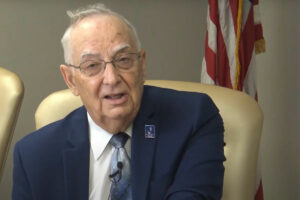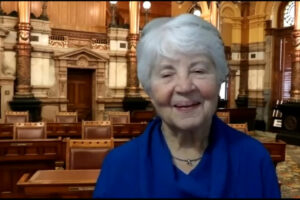Topic: Computer printouts on school finance

Interview of Dale Dennis, August 28, 2020
Interviewed by Andy Tompkins
People interested in the development of education policy in Kansas will find no better resource than this 2020 oral history interview with Dale Dennis, Deputy Commissioner of Education. The interview was conducted by Dr. Andy Tompkins, a former Kansas Commissioner of Education. During the interview, Dennis speaks candidly about policy development, identifying the issues and the legislators who were intrinsically involved. The interview covers the 1972 lawsuit which was the first dealing with issues of equity in school funding. Twenty years later, a 1992 school finance lawsuit again challenged the lack of equalization which rendered the formula unconstitutional. Dennis explains Show Morein detail the process by which the Legislature, Governor Joan Finney, Speaker Marvin Barkis, and others went about addressing the Court's concerns. By 2000 the Legislature had again failed to fund the school finance formula fully and the Montoy lawsuit arose. Another case, Gannon, began in 2010. This time the problem was the adequacy of the funding to meet constitutional requirements. Moving on from school finance lawsuits, the interview covers school consolidation and related issues of local control. Dennis explains why he started offering budget workshops to school administrators, including the development of software and the use of computers. This interview includes a brief discussion of the 1999-2000 legislation that moved state oversight of community colleges and technical schools (later termed technical colleges) from the Kansas Department of Education to the Kansas Board of Regents. Show Less

Interview of Sheila Frahm, November 13, 2020
Interviewed by Joan Wagnon
In this 2020 oral history interview, former Kansas State Senator Sheila Frahm reflects on her time in elected office from local school board to U.S. Senate. This interview was conducted on ZOOM with Frahm at her home in Arizona and the interviewer in Topeka. The interview begins with a discussion of an earlier (1991) interview conducted by a Washburn University professor that covers much of Frahm's background and her interest in education issues. It covers her life in Topeka in the early years of her service and how her family moved to Topeka with her for the session each year Show Moreand why. Frahm provides a unique point of view on the relationships between Governors and the Legislature. She discusses her decision to leave the legislature and run for Lt. Governor with Bill Graves and her subsequent appointment to fill a U.S. Senate vacancy when Bob Dole decided to run for President. This interview includes a segment during which Frahm talks about several issues in which she was involved: community colleges and out-district tuition and triple-trailers. During the interview Frahm reflects on her identity as a western Kansas legislator and how her roots, her up-bringing, shaped others' perceptions of her legislatively. She saw the years during which she served in the State Senate as very productive, citing school finance in 1992 and advances in higher education as two important policies that were enacted. The interview concludes with Frahm's reflections on the civility of the body, the importance of relationships to accomplish your goals, and advice to prospective candidates. Show Less

Interview of William (Bill) Reardon, August 2, 2019
Interviewed by Jim McLean
Bill Reardon is a story-teller, famous in the Democrat caucus for his jokes, stories and anecdotes, told with great enthusiasm. This entertaining interview is also filled with some of those stories. Reardon talks about how he was inspired by seeing John F. Kennedy in Kansas City and also by his brother and father, both political figures in Wyandotte County. There is an entertaining description of a hearing he chaired in the Federal and State Affairs committee on the Equal Rights Amendment in 1977. Reardon divides his legislative service into two periods—the bipartisan problem-solving work of the first 15 years, and Show Morea more ideologically driven, partisan era in the last fifteen years. His descriptions of developing and passing the 1992 school finance bill are consistent with other interviews of legislators serving at that time. Reardon tells stories about how leadership worked and discloses his observations about the Brownback years when he was serving as a lobbyist for the school district. He did end the interview with his story about a land turtle which was not transcribed because of its length, but if you see Reardon, ask him about the turtle story. Show Less
